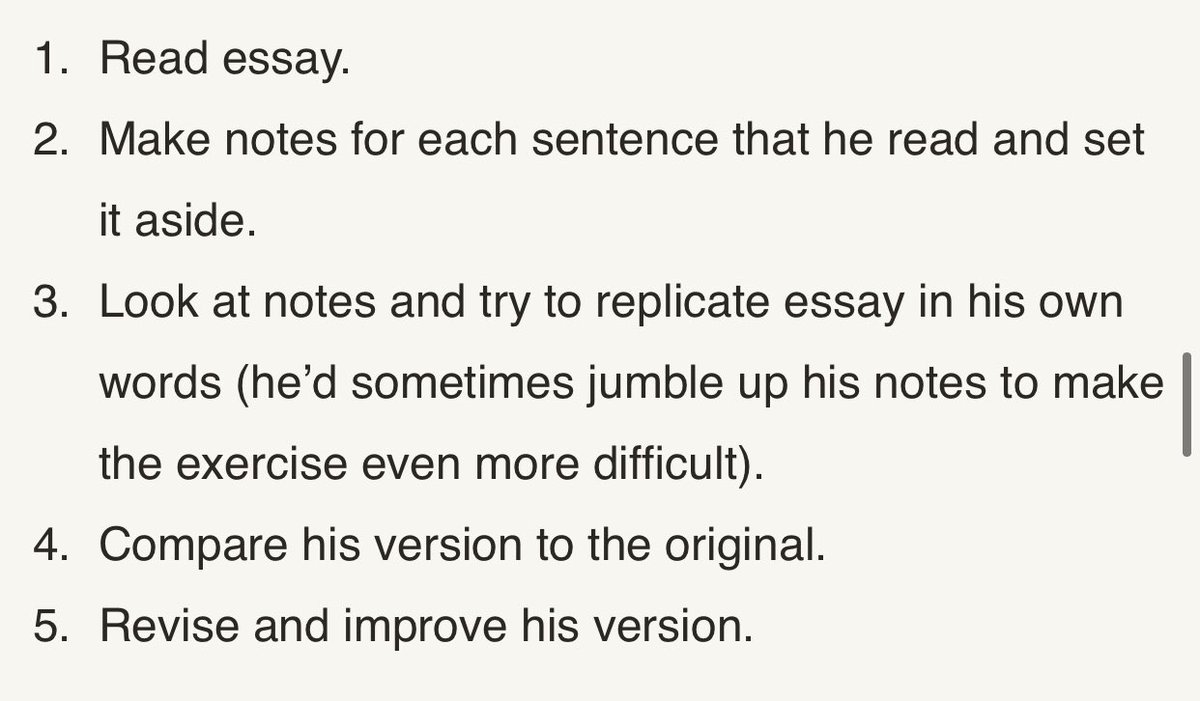Reading is essential for becoming a better writer.
But even the most proactive way of reading isn't enough.
If you really want to improve, you should try doing copywork.
Let me explain
But even the most proactive way of reading isn't enough.
If you really want to improve, you should try doing copywork.
Let me explain

Copywork is very simple: You take the work of a writer you look up to and copy it down, word by word.
You can either type it or do it by hand.
But some studies suggest that doing it by hand might be more effective in terms of recalling.
Up to you.
You can either type it or do it by hand.
But some studies suggest that doing it by hand might be more effective in terms of recalling.
Up to you.
Imitation is one of the most natural and effective ways to learn something.
Athletes do this all the time.
Yet, for some reason, writers don’t seem to do this anymore.
It’s totally underrated.
Athletes do this all the time.
Yet, for some reason, writers don’t seem to do this anymore.
It’s totally underrated.
Copywork allows you to better understand the principles and patterns behind the writing masterpieces you admire.
It’s like getting into the author’s brain and seeing his thought process.
That way you can reverse-engineer their work.
It’s like getting into the author’s brain and seeing his thought process.
That way you can reverse-engineer their work.
By doing this you also improve your style, grammar and word choice.
You improve your syntax and vocabulary.
You learn how to build sentences and paragraphs the way they did.
Then, you can add your own touch and personality to make it yours.
You improve your syntax and vocabulary.
You learn how to build sentences and paragraphs the way they did.
Then, you can add your own touch and personality to make it yours.
Some examples:
Jack London copied Rudyard Kipling’s work word by word.
R. Stevenson studied the works of great writers and tried to memorize entire passages.
H. Thompson copied The Great Gatsby and A Farewell to Arms page by page.
Ben Franklin came up with his own approach:
Jack London copied Rudyard Kipling’s work word by word.
R. Stevenson studied the works of great writers and tried to memorize entire passages.
H. Thompson copied The Great Gatsby and A Farewell to Arms page by page.
Ben Franklin came up with his own approach:
As you can imagine, this doesn’t apply just to fiction.
I’ve heard copywriters do this too.
I’m going to start doing it myself for nonfiction.
Planning to start rewriting some of @paulg’s essays first.
Will document the process.
I’ve heard copywriters do this too.
I’m going to start doing it myself for nonfiction.
Planning to start rewriting some of @paulg’s essays first.
Will document the process.
In the meantime,
You can sign up for The Online Writing Bible to get more dope writing tips, advice and resources like this https://writingbible.co/
https://writingbible.co/
You can sign up for The Online Writing Bible to get more dope writing tips, advice and resources like this
 https://writingbible.co/
https://writingbible.co/

 Read on Twitter
Read on Twitter


